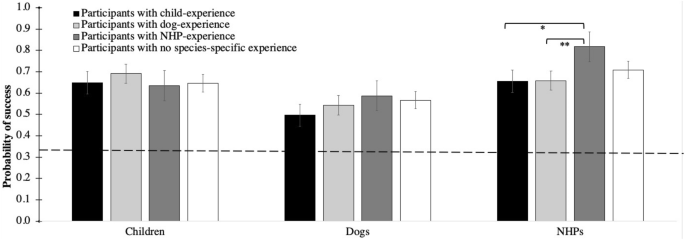犬の飼い主だからといって、それだけでは犬について知っているわけではないということが論文発表されています。
Experience has a limited effect on humans’ ability
書誌情報Donnier, S., Kovács, G., Oña, L.S. et al. Experience has a limited effect on humans’ ability to predict the outcome of social interactions in children, dogs and macaques. Sci Rep 10, 21240 (2020). https://doi.org/10.1038/s41598-020-78275-5
表題の論文を日本語訳してみました。翻訳アプリにかけた日本語訳を英文に照らして修正していますが、表記のゆれや訳の間違いがあるかもしれません。正確に内容を知りたい方は原文をご覧ください。
要約
他者の行動を予測する能力は、個体がより速く、より適切に反応することを可能にする重要なメカニズムである。
これまで、ヒトの行動予測能力についてはいくつかの研究がなされてきたが、他の種における行動予測能力についてはほとんど知られていない。
本研究では、イヌ、サル、ヒトの社会的行動を予測するヒトの能力を検証し、この能力の出現に経験と進化が果たす役割を評価することを目的とした。
この目的のために、我々は犬、子ども、サルの二人組における実際の社会的相互作用の短いビデオクリップを参加者に提示し、観察された相互作用の結果(すなわち、攻撃的、中立、遊び心)を予測するよう依頼した。
参加者は犬・子ども・サルとの種特異的な経験の有無によって選ばれた。
その結果、社会的相互作用の結果を予測する能力に対する経験の効果は限定的であり、それは主にサルに限定されたものであった。
さらに、参加者は犬の行動予測に特に長けているわけではないという点で、共家畜化仮説の裏付けは得られなかった。
さいごに、参加者たちは、犬の攻撃的な反応に対して、遊びや中立的な反応とくらべ、有意に間違って予測したのである。
この結果をもとに、他の霊長類を含めることや、種を超えて行動を予測する能力に関する文化的要因の評価など、今後の研究の可能性を示唆する。

The ability to predict others’ behaviour represents a crucial mechanism which allows individuals to react faster and more appropriately. To date, several studies have investigated humans’ ability to predict conspecifics’ behaviour, but little is known on our ability to predict behaviour in other species. Here, we aimed to test humans’ ability to predict social behaviour in dogs, macaques and humans, and assess the role played by experience and evolution on the emergence of this ability. For this purpose, we presented participants with short videoclips of real-life social interactions in dog, child and macaque dyads, and then asked them to predict the outcome of the observed interactions (i.e. aggressive, neutral or playful). Participants were selected according to their previous species-specific experience with dogs, children and non-human primates. Our results showed a limited effect of experience on the ability to predict the outcome of social interactions, which was mainly restricted to macaques. Moreover, we found no support to the co-domestication hypothesis, in that participants were not especially skilled at predicting dog behaviour. Finally, aggressive outcomes in dogs were predicted significantly worse than playful or neutral ones. Based on our findings, we suggest possible lines for future research, like the inclusion of other primate species and the assessment of cultural factors on the ability to predict behaviour across species.